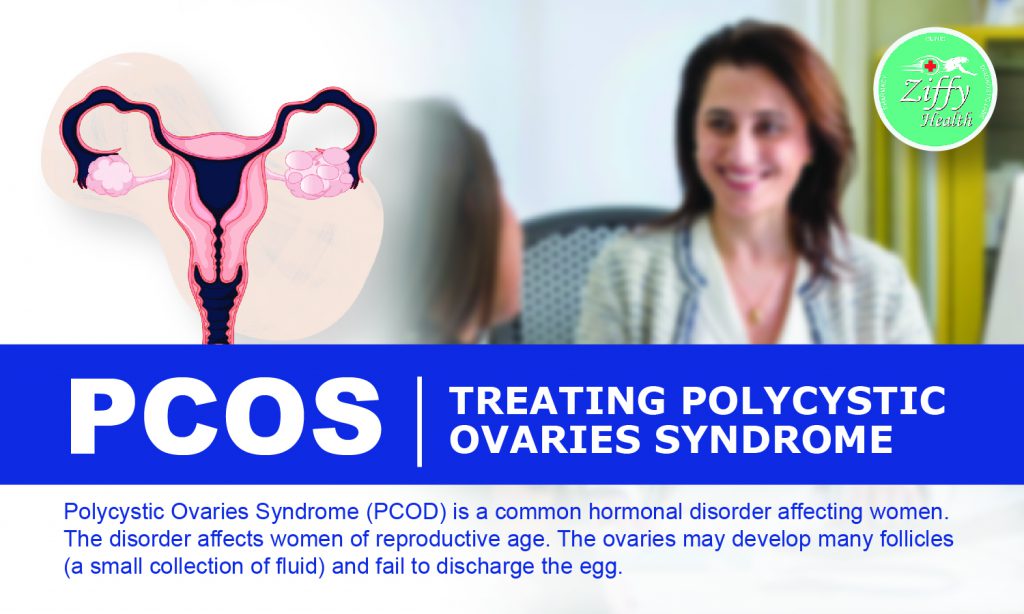
Polycystic Ovaries Syndrome (PCOD) is a common hormonal disorder affecting women. The disorder affects women of reproductive age. Women with PCOD may have longer and irregular menstrual cycles or excess male hormones. The ovaries may develop many follicles (a small collection of fluid) and fail to discharge the egg.
The condition can cause acne and excessive body hair. Many women suffer from the disorder but remain undiagnosed.
Symptoms and Causes
Symptoms of PCOD develop during puberty. PCOD can develop due to weight gain. The signs of the disorder can vary common symptoms are
- An irregular, prolonged, or missed menstrual cycle is the most common sign of the disease.
- Excessive male hormone called androgen may result in excessive facial and body hair. It may also lead to baldness and acne.
- Darkened skin or skin tags on your neck or armpits.
- Sore pelvic
- Weight gain
The exact cause of PCOD is not known the condition may be hereditary or genetic. The condition may be caused if you are insulin resistant. Excessive insulin may increase androgen production in your body. Your ovaries may produce a high level of androgen resulting in excessive hair growth and acne. PCOD can be triggered by an increased level of inflammation or excessive white blood cells in the body.
You should book the best gynecologist in Patna if they are worried about your periods, are having trouble conceiving, or have excessive facial and body hair, excessive pimples or male pattern baldness. PCOD can have serious complications and should not be ignored.
Complications
PCOD causes infertility in many women. It increases complication such as premature birth or miscarriage. PCOD can cause excessive bleeding during menstruation. The condition can increase the risk of endometrial cancer(cancer of uterine lining). PCOD leads to weight gain; around 80% of women with the condition are either obese or overweight. This, in turn, can cause serious health problems such as diabetes, high cholesterol, and high blood pressure. PCOD may cause sleep apnea. Hormonal imbalance caused by PCOD may cause depression and anxiety disorder. Ziffytech will help you to find best gynecologist doctors in patna also you can find best Pediatrician in Patna and diagnostic center near you.
Diagnosis and Treatment
The best doctors in Patna will first review your medical history and complete physical examination. During the examination, they will ask you details about your menstrual cycle and examine you for the physical sign of PCOD.
The best gynecologist near me is likely to conduct a pelvic exam to inspect your ovaries and other reproductive organs for any abnormalities. They may order blood tests at home to check androgen levels, cholesterol and triglyceride levels, and glucose level in your blood. The gynecologist may also order an ultrasound to check the appearance of the ovaries and uterus.
The treatment for PCOD focuses on managing your symptoms. The best gynecologist in Patna may order some lifestyle changes to help you lose weight. Research has shown 5-10% weight loss has improved the symptoms of the diseases. Losing weight will improve the effectiveness of the treatment. A combination of dieting and excising has been recommended for effective weight loss.
If you are trying to get pregnant the best gynecologist near me will try to prescribe hormonal birth control either medicines or skin patch. These medicines will help to regularize your periods and reduce symptoms such as hair growth. The doctor may prescribe fertility medication to help you get pregnant.
Your gynecologist may prescribe diabetes medication to reduce insulin resistance, control ovulation, and to assist you with your weight loss.

 Log in with Facebook
Log in with Facebook 








